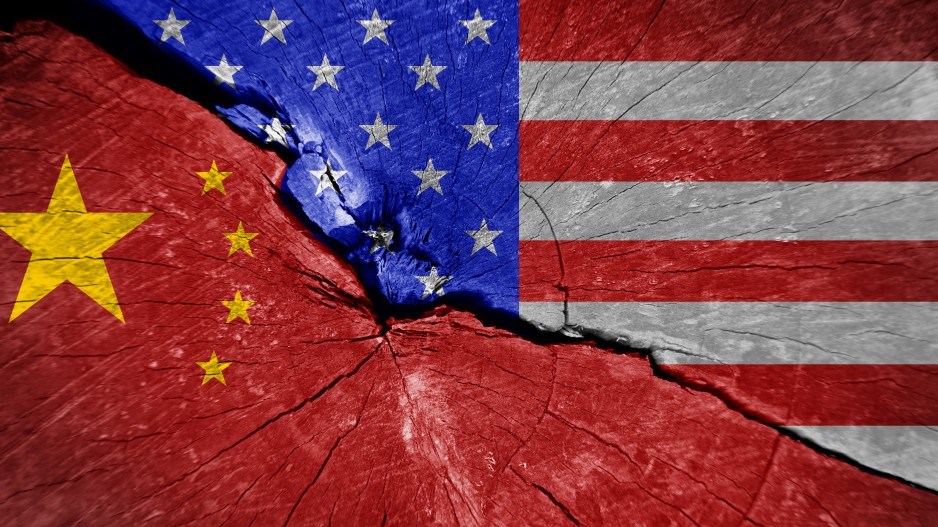The outcome of on-again, off-again talks between Washington and Beijing on resolving their tariff war – and their effect on trade between B.C. and China – remain cloudy and won’t become clear until details of an eventual agreement are revealed.
That is the view of analysts who are following the talks, which took several turns in early December when the 20-month-long conflict appeared likely to continue into the new year. U.S. President Donald Trump said on December 3 that Washington is comfortable with the idea of heading into 2020 without an agreement and that the White House does not “have a deadline.”
Meanwhile, media reports have surfaced that despite Trump’s comments and the reciprocal harsher stance now taken by Beijing ahead of a new round of tariffs scheduled to go into effect on December 15, the United States and China may be moving closer to tariff rollback. Meanwhile, the U.S. Congress recently passed legislation looking to sanction officials in China over human-rights issues in Hong Kong and Xinjiang, further complicating the talks.
Regardless of whether a deal is reached on December 15, when the United States will add a 15% tariff on about US$160 billion worth of Chinese exports, or whether talks drag into 2020, one analyst said the rhetoric from both Beijing and Washington is just talk until a firm announcement is made.
“The first point is that it’s never over until it’s over,” said Asia Pacific Foundation of Canada distinguished fellow Hugh Stephens. “A further delay is not that surprising, but tomorrow Trump could tweet that things are back on track. He likes to keep people – including his own people – guessing.”
Stephens added that if a new round of U.S. tariffs on Chinese goods goes into effect, it will hurt Canadian businesses simply because of Canada’s dependence on global trade, which would take a considerable hit from new tariffs.
But that does not mean that companies in B.C. and elsewhere in Canada should automatically cheer an agreement, either, he noted.
“It will benefit Canada and global trade if the U.S. and China can come to mutual disarmament agreements in terms of tariffs, but it depends on the terms,” Stephens said. “If China agrees to discipline SOEs [Chinese state-owned enterprises] and respect [U.S.] intellectual property, that will also be good for Canada. If the outcome is a managed trade deal where China agrees to buy more U.S. agricultural goods – possibly at the expense of the most efficient supplier, which could be Canada – then the result will not be positive.”
While a rollback of tariffs could benefit aspects of Chinese-American business relations (perhaps at the expense of Chinese-Canadian ones), some U.S. analysts remain skeptical that an agreement with China would yield anything valuable for Washington when the big picture is taken into account.
Park Strategies senior vice-president and Asia-Pacific geopolitical analyst Sean King said that looking at the details of an eventual deal with China misses the point for U.S. business and other interests, and he doesn’t see a case where U.S. businesses would hugely benefit from a deal at the expense of Canadian counterparts.
“I’m not looking for anything in particular [in the deal], as it doesn’t much matter in the long run,” King said. “Mainland China’s a Marxist-Leninist, one-party state that can’t do business the way most American companies would like it to. Its economic policies won’t substantively change until its politics does, and I don’t see that happening any time soon.”
The idea that a U.S.-China trade deal would include strengthened intellectual property protection is a key point for one Canadian official who had been working with the Chinese on technology issues for decades before current Canada-China frictions raised red flags for her.
Margaret McCuaig-Johnston, senior fellow at the Institute for Science, Society and Policy at the University of Ottawa, said she has seen multiple cases of intellectual property transfer to Chinese firms through joint ventures with western companies, where most of the benefits go to Beijing.
Increased IP protection in a trade deal – even a China-U.S. one – that would strengthen protection of companies in B.C. and Canada would be crucial in determining if Canadian companies should deepen relations with China or pull back, she said.
“Technology trade should be from Canada to China,” McCuaig-Johnston said. “Having a joint venture is China’s preference, and that’s not trade. In the case of Canada, that’s an investment in China. Jobs and sales that are generated are almost all in China. We should be looking in the coming months with the new government at trade deals that bring truly important benefits to Canada, as opposed to seeing our technology siphoned off over time, and all the jobs being in China.”




